seven deadly sins 七宗罪演讲 全英语
- 格式:ppt
- 大小:5.18 MB
- 文档页数:11
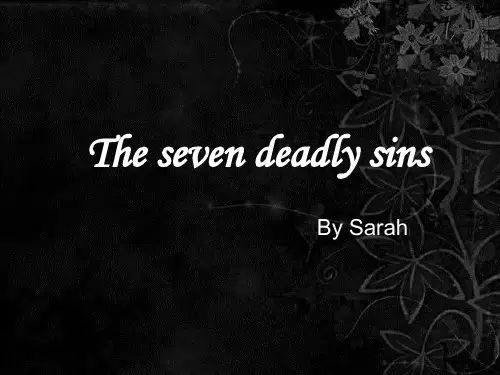

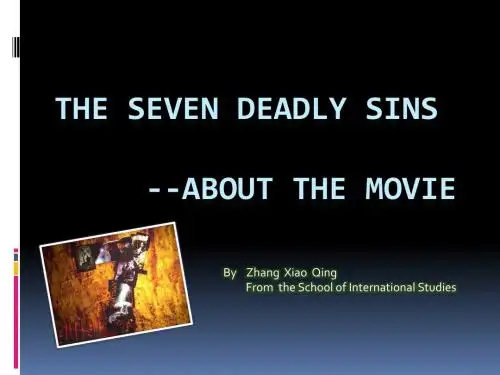
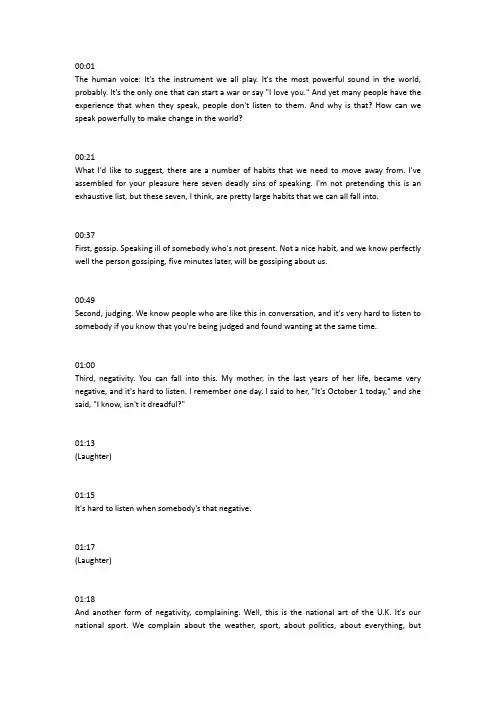
00:01The human voice: It's the instrument we all play. It's the most powerful sound in the world, probably. It's the only one that can start a war or say "I love you." And yet many people have the experience that when they speak, people don't listen to them. And why is that? How can we speak powerfully to make change in the world?00:21What I'd like to suggest, there are a number of habits that we need to move away from. I've assembled for your pleasure here seven deadly sins of speaking. I'm not pretending this is an exhaustive list, but these seven, I think, are pretty large habits that we can all fall into.00:37First, gossip. Speaking ill of somebody who's not present. Not a nice habit, and we know perfectly well the person gossiping, five minutes later, will be gossiping about us.00:49Second, judging. We know people who are like this in conversation, and it's very hard to listen to somebody if you know that you're being judged and found wanting at the same time.01:00Third, negativity. You can fall into this. My mother, in the last years of her life, became very negative, and it's hard to listen. I remember one day, I said to her, "It's October 1 today," and she said, "I know, isn't it dreadful?"01:13(Laughter)01:15It's hard to listen when somebody's that negative.01:17(Laughter)01:18And another form of negativity, complaining. Well, this is the national art of the U.K. It's our national sport. We complain about the weather, sport, about politics, about everything, butactually, complaining is viral misery. It's not spreading sunshine and lightness in the world.01:36Excuses.01:38We've all met this guy. Maybe we've all been this guy. Some people have a blamethrower. They just pass it on to everybody else and don't take responsibility for their actions, and again, hard to listen to somebody who is being like that.01:50Penultimate, the sixth of the seven, embroidery, exaggeration. It demeans our language, actually, sometimes. For example, if I see something that really is awesome, what do I call it?02:03(Laughter)02:05And then, of course, this exaggeration becomes lying, and we don't want to listen to people we know are lying to us.02:12And finally, dogmatism. The confusion of facts with opinions. When those two things get conflated, you're listening into the wind. You know, somebody is bombarding you with their opinions as if they were true. It's difficult to listen to that.02:28So here they are, seven deadly sins of speaking. These are things I think we need to avoid. But is there a positive way to think about this? Yes, there is. I'd like to suggest that there are four really powerful cornerstones, foundations, that we can stand on if we want our speech to be powerful and to make change in the world. Fortunately, these things spell a word. The word is "hail," and it has a great definition as well. I'm not talking about the stuff that falls from the sky and hits you on the head. I'm talking about this definition, to greet or acclaim enthusiastically, which is how I think our words will be received if we stand on these four things.03:06So what do they stand for? See if you can guess. The H, honesty, of course, being true in what you say, being straight and clear. The A is authenticity, just being yourself. A friend of mine described it as standing in your own truth, which I think is a lovely way to put it. The I is integrity, being your word, actually doing what you say, and being somebody people can trust. And the L is love. I don't mean romantic love, but I do mean wishing people well, for two reasons. First of all, I think absolute honesty may not be what we want. I mean, my goodness, you look ugly this morning. Perhaps that's not necessary. Tempered with love, of course, honesty is a great thing. But also, if you're really wishing somebody well, it's very hard to judge them at the same time. I'm not even sure you can do those two things simultaneously. So hail.04:04Also, now that's what you say, and it's like the old song, it is what you say, it's also the way that you say it. You have an amazing toolbox. This instrument is incredible, and yet this is a toolbox that very few people have ever opened. I'd like to have a little rummage in there with you now and just pull a few tools out that you might like to take away and play with, which will increase the power of your speaking.04:26Register, for example. Now, falsetto register may not be very useful most of the time, but there's a register in between. I'm not going to get very technical about this for any of you who are voice coaches. You can locate your voice, however. So if I talk up here in my nose, you can hear the difference. If I go down here in my throat, which is where most of us speak from most of the time. But if you want weight, you need to go down here to the chest. You hear the difference? We vote for politicians with lower voices, it's true, because we associate depth with power and with authority. That's register.05:04Then we have timbre. It's the way your voice feels. Again, the research shows that we prefer voices which are rich, smooth, warm, like hot chocolate. Well if that's not you, that's not the end of the world, because you can train. Go and get a voice coach. And there are amazing things you can do with breathing, with posture, and with exercises to improve the timbre of your voice.05:27Then prosody. I love prosody. This is the sing-song, the meta-language that we use in order to impart meaning. It's root one for meaning in conversation. People who speak all on one note are really quite hard to listen to if they don't have any prosody at all. That's where the word "monotonic" comes from, or monotonous, monotone. Also, we have repetitive prosody now coming in, where every sentence ends as if it were a question when it's actually not a question, it's a statement?05:56(Laughter)05:59And if you repeat that one, it's actually restricting your ability to communicate through prosody, which I think is a shame, so let's try and break that habit.06:09Pace.06:10I can get very excited by saying something really quickly, or I can slow right down to emphasize, and at the end of that, of course, is our old friend silence. There's nothing wrong with a bit of silence in a talk, is there? We don't have to fill it with ums and ahs. It can be very powerful.06:31Of course, pitch often goes along with pace to indicate arousal, but you can do it just with pitch. Where did you leave my keys? (Higher pitch) Where did you leave my keys? So, slightly different meaning in those two deliveries.06:44And finally, volume. (Loud) I can get really excited by using volume. Sorry about that, if I startled anybody. Or, I can have you really pay attention by getting very quiet. Some people broadcast the whole time. Try not to do that. That's called sodcasting,07:01(Laughter)07:03Imposing your sound on people around you carelessly and inconsiderately. Not nice.07:09Of course, where this all comes into play most of all is when you've got something really important to do. It might be standing on a stage like this and giving a talk to people. It might be proposing marriage, asking for a raise, a wedding speech. Whatever it is, if it's really important,you owe it to yourself to look at this toolbox and the engine that it's going to work on, and no engine works well without being warmed up. Warm up your voice.07:35Actually, let me show you how to do that. Would you all like to stand up for a moment? I'm going to show you the six vocal warm-up exercises that I do before every talk I ever do. Any time you're going to talk to anybody important, do these. First, arms up, deep breath in, and sigh out, ahhhhh, like that. One more time. Ahhhh, very good. Now we're going to warm up our lips, and we're going to go Ba, Ba, Ba, Ba, Ba, Ba, Ba, Ba. Very good. And now, brrrrrrrrrr, just like when you were a kid. Brrrr. Now your lips should be coming alive. We're going to do the tongue next with exaggerated la, la, la, la, la, la, la, la, la. Beautiful. You're getting really good at this. And then, roll an R. Rrrrrrr. That's like champagne for the tongue. Finally, and if I can only do one, the pros call this the siren. It's really good. It starts with "we" and goes to "aw." The "we" is high, the "aw" is low. So you go, weeeaawww, weeeaawww.08:42Fantastic. Give yourselves a round of applause. Take a seat, thank you.08:46(Applause)08:47Next time you speak, do those in advance.08:50Now let me just put this in context to close. This is a serious point here. This is where we are now, right? We speak not very well to people who simply aren't listening in an environment that's all about noise and bad acoustics. I have talked about that on this stage in different phases. What would the world be like if we were speaking powerfully to people who were listening consciously in environments which were actually fit for purpose? Or to make that a bit larger, what would the world be like if we were creating sound consciously and consuming sound consciously and designing all our environments consciously for sound? That would be a world that does sound beautiful, and one where understanding would be the norm, and that is an idea worth spreading.09:37Thank you.我們每個人,都會運用語音。
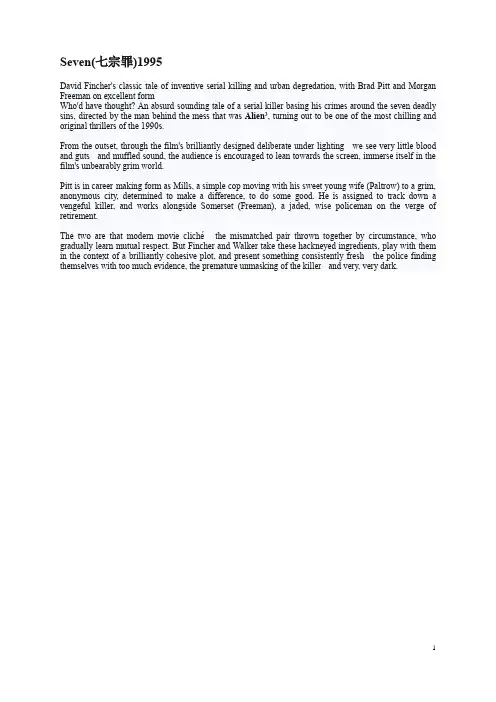
Seven(七宗罪)1995David Fincher's classic tale of inventive serial killing and urban degredation, with Brad Pitt and Morgan Freeman on excellent formWho'd have thought? An absurd-sounding tale of a serial killer basing his crimes around the seven deadly sins, directed by the man behind the mess that was Alien3, turning out to be one of the most chilling and original thrillers of the 1990s.From the outset, through the film's brilliantly designed deliberate under-lighting - we see very little blood and guts - and muffled sound, the audience is encouraged to lean towards the screen, immerse itself in the film's unbearably grim world.Pitt is in career-making form as Mills, a simple cop moving with his sweet young wife (Paltrow) to a grim, anonymous city, determined to make a difference, to do some good. He is assigned to track down a vengeful killer, and works alongside Somerset (Freeman), a jaded, wise policeman on the verge of retirement.The two are that modern movie cliché -the mismatched pair thrown together by circumstance, who gradually learn mutual respect. But Fincher and Walker take these hackneyed ingredients, play with them in the context of a brilliantly cohesive plot, and present something consistently fresh - the police finding themselves with too much evidence, the premature unmasking of the killer - and very, very dark.1。

介绍幸运数字7的英语作文英文回答:The number 7 has long been associated with good luck in many cultures around the world. It is often seen as a symbol of perfection, completeness, and divine favor.In numerology, the number 7 is considered to be a lucky number. It is associated with the planet Saturn, which is known for its sternness and discipline. However, Saturn is also associated with wisdom, maturity, and responsibility. As such, the number 7 is often seen as a symbol of balance and harmony.In many cultures, the number 7 is associated with religion and spirituality. In Christianity, for example, there are seven days in the week, seven sacraments, and seven deadly sins. In Islam, there are seven heavens and seven layers of hell. In Hinduism, there are seven chakras, or energy centers, in the body.The number 7 is also found in many works of literature, art, and music. In William Shakespeare's play "Macbeth," the witches chant "Double, double toil and trouble; Fire burn and cauldron bubble." They repeat this chant seven times, emphasizing the number's association with magic and the supernatural. In the musical "The Sound of Music," the song "Do-Re-Mi" uses the seven notes of the musical scale.Of course, the number 7 is not always seen as a lucky number. In some cultures, it is considered to be an unlucky number. In China, for example, the number 7 is associated with death. This is because the Chinese word for "seven" sounds similar to the word for "death."Despite its occasional negative connotations, the number 7 remains a popular symbol of good luck in many cultures around the world. It is often used in amulets, talismans, and other objects that are believed to bring good fortune.中文回答:7这个数字长期以来在世界许多文化中都被认为是幸运的象征。
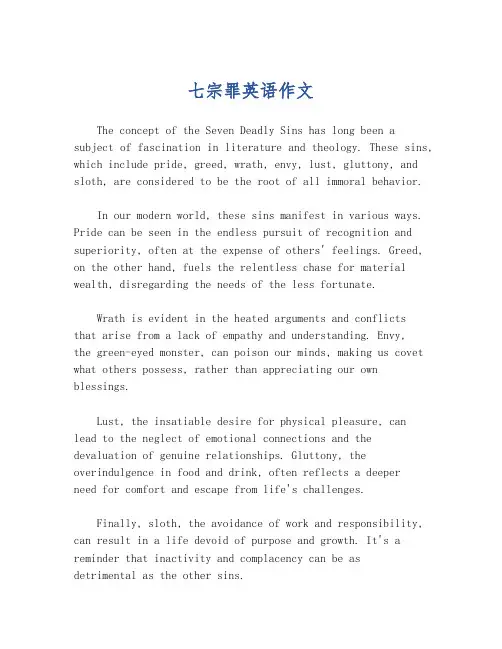
七宗罪英语作文The concept of the Seven Deadly Sins has long been a subject of fascination in literature and theology. These sins, which include pride, greed, wrath, envy, lust, gluttony, and sloth, are considered to be the root of all immoral behavior.In our modern world, these sins manifest in various ways. Pride can be seen in the endless pursuit of recognition and superiority, often at the expense of others' feelings. Greed, on the other hand, fuels the relentless chase for material wealth, disregarding the needs of the less fortunate.Wrath is evident in the heated arguments and conflictsthat arise from a lack of empathy and understanding. Envy,the green-eyed monster, can poison our minds, making us covet what others possess, rather than appreciating our own blessings.Lust, the insatiable desire for physical pleasure, canlead to the neglect of emotional connections and the devaluation of genuine relationships. Gluttony, the overindulgence in food and drink, often reflects a deeperneed for comfort and escape from life's challenges.Finally, sloth, the avoidance of work and responsibility, can result in a life devoid of purpose and growth. It's a reminder that inactivity and complacency can be asdetrimental as the other sins.Understanding these sins is crucial for personal growth and societal harmony. By recognizing and addressing them, we can strive to cultivate virtues such as humility, generosity, patience, kindness, self-control, and diligence. This journey towards moral improvement is a lifelong endeavor that requires constant self-reflection and the willingness to change.。

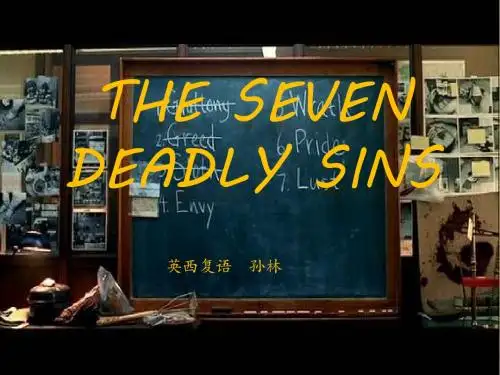

00:01The human voice: It's the instrument we all play. It's the most powerful sound in the world, probably. It's the only one that can start a war or say "I love you." And yet many people have the experience that when they speak, people don't listen to them. And why is that? How can we speak powerfully to make change in the world?00:21What I'd like to suggest, there are a number of habits that we need to move away from. I've assembled for your pleasure here seven deadly sins of speaking. I'm not pretending this is an exhaustive list, but these seven, I think, are pretty large habits that we can all fall into.00:37First, gossip. Speaking ill of somebody who's not present. Not a nice habit, and we know perfectly well the person gossiping, five minutes later, will be gossiping about us.00:49Second, judging. We know people who are like this in conversation, and it's very hard to listen to somebody if you know that you're being judged and found wanting at the same time.01:00Third, negativity. You can fall into this. My mother, in the last years of her life, became very negative, and it's hard to listen. I remember one day, I said to her, "It's October 1 today," and she said, "I know, isn't it dreadful?"01:13(Laughter)01:15It's hard to listen when somebody's that negative.01:17(Laughter)01:18And another form of negativity, complaining. Well, this is the national art of the U.K. It's our national sport. We complain about the weather, sport, about politics, about everything, butactually, complaining is viral misery. It's not spreading sunshine and lightness in the world.01:36Excuses.01:38We've all met this guy. Maybe we've all been this guy. Some people have a blamethrower. They just pass it on to everybody else and don't take responsibility for their actions, and again, hard to listen to somebody who is being like that.01:50Penultimate, the sixth of the seven, embroidery, exaggeration. It demeans our language, actually, sometimes. For example, if I see something that really is awesome, what do I call it?02:03(Laughter)02:05And then, of course, this exaggeration becomes lying, and we don't want to listen to people we know are lying to us.02:12And finally, dogmatism. The confusion of facts with opinions. When those two things get conflated, you're listening into the wind. You know, somebody is bombarding you with their opinions as if they were true. It's difficult to listen to that.02:28So here they are, seven deadly sins of speaking. These are things I think we need to avoid. But is there a positive way to think about this? Yes, there is. I'd like to suggest that there are four really powerful cornerstones, foundations, that we can stand on if we want our speech to be powerful and to make change in the world. Fortunately, these things spell a word. The word is "hail," and it has a great definition as well. I'm not talking about the stuff that falls from the sky and hits you on the head. I'm talking about this definition, to greet or acclaim enthusiastically, which is how I think our words will be received if we stand on these four things.03:06So what do they stand for? See if you can guess. The H, honesty, of course, being true in what you say, being straight and clear. The A is authenticity, just being yourself. A friend of mine described it as standing in your own truth, which I think is a lovely way to put it. The I is integrity, being your word, actually doing what you say, and being somebody people can trust. And the L is love. I don't mean romantic love, but I do mean wishing people well, for two reasons. First of all, I think absolute honesty may not be what we want. I mean, my goodness, you look ugly this morning. Perhaps that's not necessary. Tempered with love, of course, honesty is a great thing. But also, if you're really wishing somebody well, it's very hard to judge them at the same time. I'm not even sure you can do those two things simultaneously. So hail.04:04Also, now that's what you say, and it's like the old song, it is what you say, it's also the way that you say it. You have an amazing toolbox. This instrument is incredible, and yet this is a toolbox that very few people have ever opened. I'd like to have a little rummage in there with you now and just pull a few tools out that you might like to take away and play with, which will increase the power of your speaking.04:26Register, for example. Now, falsetto register may not be very useful most of the time, but there's a register in between. I'm not going to get very technical about this for any of you who are voice coaches. You can locate your voice, however. So if I talk up here in my nose, you can hear the difference. If I go down here in my throat, which is where most of us speak from most of the time. But if you want weight, you need to go down here to the chest. You hear the difference? We vote for politicians with lower voices, it's true, because we associate depth with power and with authority. That's register.05:04Then we have timbre. It's the way your voice feels. Again, the research shows that we prefer voices which are rich, smooth, warm, like hot chocolate. Well if that's not you, that's not the end of the world, because you can train. Go and get a voice coach. And there are amazing things you can do with breathing, with posture, and with exercises to improve the timbre of your voice.05:27Then prosody. I love prosody. This is the sing-song, the meta-language that we use in order to impart meaning. It's root one for meaning in conversation. People who speak all on one note are really quite hard to listen to if they don't have any prosody at all. That's where the word "monotonic" comes from, or monotonous, monotone. Also, we have repetitive prosody now coming in, where every sentence ends as if it were a question when it's actually not a question, it's a statement?05:56(Laughter)05:59And if you repeat that one, it's actually restricting your ability to communicate through prosody, which I think is a shame, so let's try and break that habit.06:09Pace.06:10I can get very excited by saying something really quickly, or I can slow right down to emphasize, and at the end of that, of course, is our old friend silence. There's nothing wrong with a bit of silence in a talk, is there? We don't have to fill it with ums and ahs. It can be very powerful.06:31Of course, pitch often goes along with pace to indicate arousal, but you can do it just with pitch. Where did you leave my keys? (Higher pitch) Where did you leave my keys? So, slightly different meaning in those two deliveries.06:44And finally, volume. (Loud) I can get really excited by using volume. Sorry about that, if I startled anybody. Or, I can have you really pay attention by getting very quiet. Some people broadcast the whole time. Try not to do that. That's called sodcasting,07:01(Laughter)07:03Imposing your sound on people around you carelessly and inconsiderately. Not nice.07:09Of course, where this all comes into play most of all is when you've got something really important to do. It might be standing on a stage like this and giving a talk to people. It might be proposing marriage, asking for a raise, a wedding speech. Whatever it is, if it's really important,you owe it to yourself to look at this toolbox and the engine that it's going to work on, and no engine works well without being warmed up. Warm up your voice.07:35Actually, let me show you how to do that. Would you all like to stand up for a moment? I'm going to show you the six vocal warm-up exercises that I do before every talk I ever do. Any time you're going to talk to anybody important, do these. First, arms up, deep breath in, and sigh out, ahhhhh, like that. One more time. Ahhhh, very good. Now we're going to warm up our lips, and we're going to go Ba, Ba, Ba, Ba, Ba, Ba, Ba, Ba. Very good. And now, brrrrrrrrrr, just like when you were a kid. Brrrr. Now your lips should be coming alive. We're going to do the tongue next with exaggerated la, la, la, la, la, la, la, la, la. Beautiful. You're getting really good at this. And then, roll an R. Rrrrrrr. That's like champagne for the tongue. Finally, and if I can only do one, the pros call this the siren. It's really good. It starts with "we" and goes to "aw." The "we" is high, the "aw" is low. So you go, weeeaawww, weeeaawww.08:42Fantastic. Give yourselves a round of applause. Take a seat, thank you.08:46(Applause)08:47Next time you speak, do those in advance.08:50Now let me just put this in context to close. This is a serious point here. This is where we are now, right? We speak not very well to people who simply aren't listening in an environment that's all about noise and bad acoustics. I have talked about that on this stage in different phases. What would the world be like if we were speaking powerfully to people who were listening consciously in environments which were actually fit for purpose? Or to make that a bit larger, what would the world be like if we were creating sound consciously and consuming sound consciously and designing all our environments consciously for sound? That would be a world that does sound beautiful, and one where understanding would be the norm, and that is an idea worth spreading.09:37Thank you.我們每個人,都會運用語音。
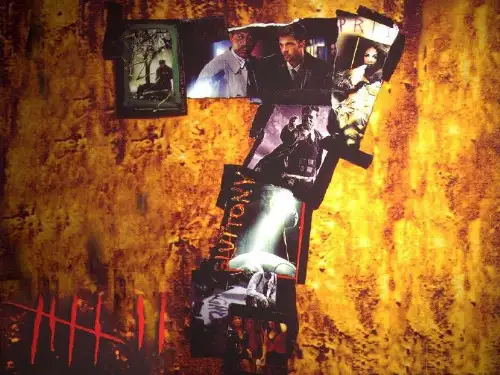
七宗罪英文The Seven Deadly Sins, also known as the capital vices or cardinal sins, are a set of sins deemed to be particularly harmful in Christian theology. The seven sins have been referenced and discussed in literature, art, and even popular culture for centuries. Let's take a closer look at each of these sins.1. PridePride is the excessive belief in one's own abilities or accomplishments, often accompanied by haughtiness, arrogance, or an overly inflated sense of self-worth. Excessive pride can lead to overconfidence and a disregard for the opinions and feelings of others. In the Bible, pride is considered a fundamental sin and the root of all sin.2. GreedGreed is the insatiable desire for material wealth or possessions. A greedy person is never satisfied with what they have and always wants more. People who are consumed by greed are often willing to do whatever it takes, even if it means hurting others, to accumulate more wealth.3. LustLust is the intense desire for sexual pleasure. It often involves a disregard for moral principles and a lack of self-control. Lust is not limited to sexual desire; it can also manifest as an intense craving for power, money, or other forms of gratification.4. EnvyEnvy is the desire to have what someone else has, whether it be material possessions, success, or relationships. It can arise from feelings of inadequacy, low self-esteem, or a sense of injustice. Envy can lead to resentment, bitterness, and even hatred towards others.5. GluttonyGluttony is the overconsumption of food or drink to the point of excess. It often involves a lack of self-discipline and an indulgence in pleasure at the expense of one's health and well-being. Gluttony can also take the form of excessive material consumption or an insatiable desire for pleasure.6. WrathWrath is the intense emotion of anger, often accompanied by a desire for revenge or punishment. It is an all-consuming emotion that can cause people to act impulsively and violently. Wrath can be directed towards anything or anyone that provokes anger or frustration.7. SlothSloth is the lack of motivation or unwillingness to exert oneself. It can manifest as laziness or apathy towards work or responsibilities. Sloth can also involve a lack of spiritual or intellectual curiosity and a failure to strive for personal growth or development.In conclusion, the Seven Deadly Sins are a powerful depiction of human nature and the flaws we all have. Recognizing and overcoming these sins can lead to a more fulfilling and virtuous life.。
TED英语演讲:情商高的人怎样说话说话是人类最常运用的沟通方式,我们每天要说不少话,也得接收很多话,有些话被听进去了,但有些话却被当成耳边风。
你是否曾怀疑:「为什么别人都不听我说话?」许多人总以为,话说了却没达到沟通的效果,八成是听话的人没专心,但其实问题也可能出在说话的人身上。
你知道到底要怎么说,别人才会听?下面是小编为大家收集关于TED英语演讲之情商高的人怎样说话,欢迎借鉴参考。
| 中英文演讲稿 |We are losing our listening. We spend roughly 60 percent of our communication time listening, But we're not very good at it. We retain just 25 percent of what we hear. Now not you, not this talk, but that is generally true. Let's define listening as making meaning from sound. It's a mental process, and it's a process of extraction.我们正在丧失倾听的能力。
我们交流过程中60%的时间都是用来倾听,但其实我们并不擅长倾听。
我们只保留了25%所听到的内容,不是指在座各位和这个演讲,这是一个普遍的事实。
让我们来定义倾听,就是使得声音有意义,这是一个心理过程,它也是一个提取的过程。
The human voice: It's the instrument we all play. It's the most powerful sound in the world, probably. It's the only one that can start a war or say "I love you." And yet many people have the experience that when they speak, people don't listen to them. And why is that? How can we speak powerfully to make change in the world?人类的声音:是我们所有人都弹奏的乐器,可能是这个世界上最有力的声音,它绝无仅有,或能引起战争,或能说“我爱你”。
The movie "seven deadly sins" film criticWe are people, people will always have a weakness, always make mistakes. Have a look of the seven deadly sins, who can say that he has not committed a, also did notsee others make it, "we are damn" perhaps this everybody's mind is darkin a word.If we can really overcome these weaknesses, I'm afraid we were in the sky in the.But even in heaven in God cannot avoid committing these crimes, one of the most famousis the "apple" for having heard it many times: three goddess for "the best in all the land of beauty", jealous of each other, theinfighting. Finally, applegave Eros Aphrodite, the Goddess: another two days later Hera and the goddess Athena envy extremely, also make the subsequent Troy war striking one snag after another. Since even the gods, but also is the goddess of wisdom, can makethis kind of human nature of crime, and we are who? We can only try to put ourdesire to bring damage to a minimum...Perhaps the movie put some things exaggerated, or write some extremethings.However, the film is the dream. The classic movie let 90% people love, regardless of race and nation. Common people is to fear, fear of death, fear of losing, fear ofpain, fear of terrible things happen in yourself. However, people would like to seethe terrible things happen to others, in bad body is deserve one'spunishment,violence was the audience gets released, justice has been done. Happen to good people are suffering, the audience to tears and sighs. The film is not philosophy,as long as two or three hours to meet the audience's psychological needs can.The seven deadly sins story is dark, high concentration of populationdensity inany society, in the big city, people's life pressure is big, big city crimerate is high,rendering developed media of violence in the course oftime, people alwaystransition, the abstract concept of fear of violence, alsoproduced immune to thespecific level of violence. The past war films shot in the chest and legs afterheroes hand over the chest down scenario now really let the children in the kindergarten are a contemptuous disregard. So the seven deadly sins of bloodyplotis very special, the only way to dial psychological audience fear that rib. Allow peopleto count the seven deadly sinsThe first is the excessive enjoyment of longitudinal food; but alsoincludecorruption, greed, also is the new seven deadly sins in order to their lives so thatmost people have poor this explanation; idleness is mediocrity of life not a positive attitude towards life; lust explanation is adultery but now include ethics.Immoral and his life for the immoral; pride is strong but more explanation iswithdrawn andnot group, and things around opposition or contempt; rage isviolence not rational behavior; jealousy is itself cannot hope people better, and make irrational behavior. The seven deadly sins of behavior is not a person can do. This 7 point is generally not the person all has avoided the shortcomings of.Only personal play just 7 days sevendays generally correspond to God made man, reveals that all have sinned. I personally think that is a kind of like the seven deadly sins a watchful of humanity at the end of thefilm was the last officer can choose rational but eventually shoot. Maybe thatis his another interpretation ofhuman nature is that he is good but he angry buthe actually can still control butin his choice of love for his wife and his later life he shot. The hero's tragic fate is inevitable. Tragedy is always the most popular, becausethe tragic people thinking. If the story believable, line integrity and directly led to atragic ending, the audience will be more pain by Brad Pit at the end of thefilmshot by criminals expression. The actor is the expression of the actor of all,remember that face it: Why did you kill my wife?! Why to want to cut off her head?Why can't I kill you!?At first I thought, he can't shoot, at least not a cavity to kill him, however, he did...... Therefore, the outcome is very shocking!! An innocentman, a full justiceto justice, people will commit crimes in specific environment. Besides others. This is a study of human nature: what, you, had committed several felonies?。